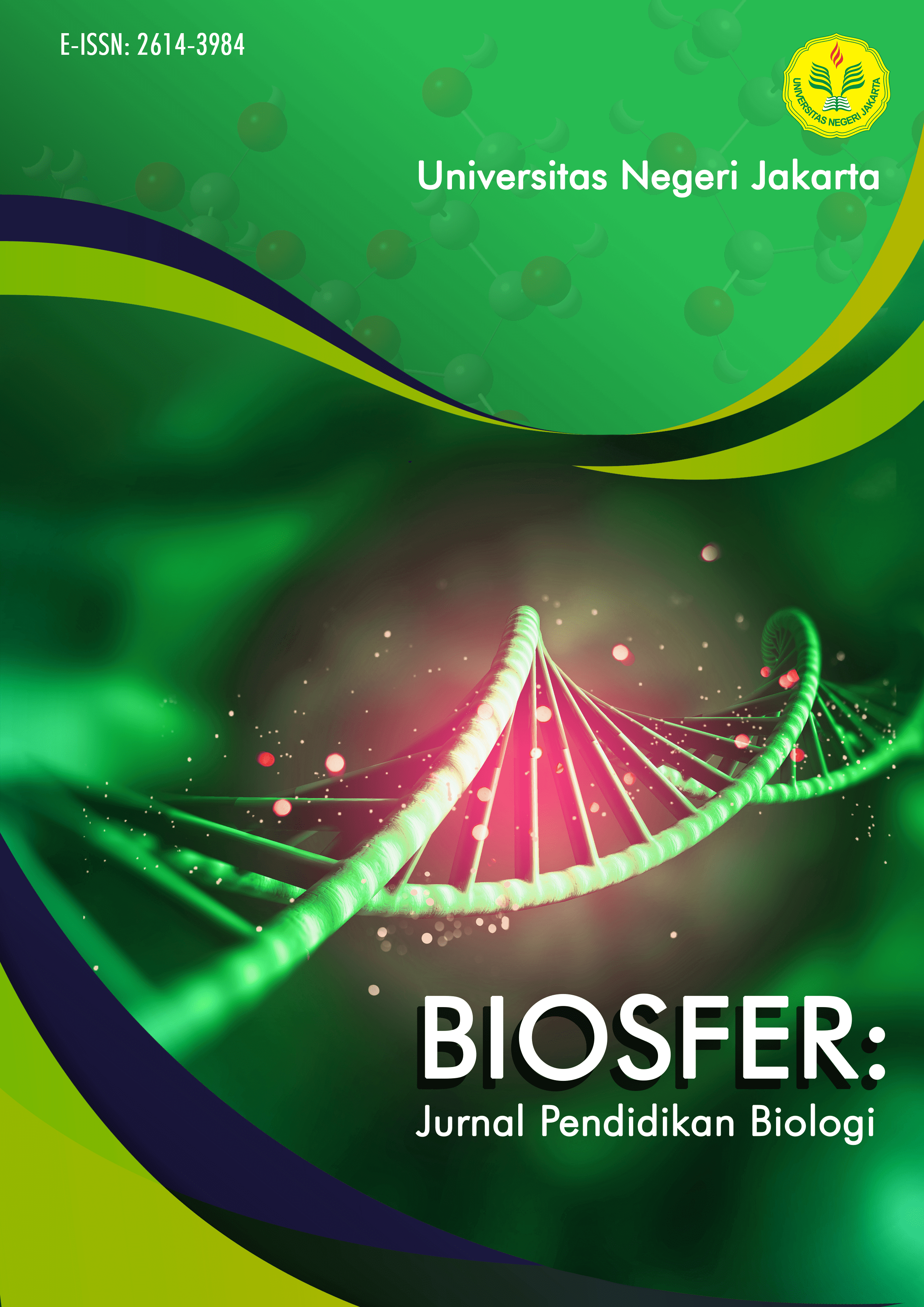Profile of ecological practicum, logical thinking, and system thinking pre-service biology teacher
DOI:
https://doi.org/10.21009/biosferjpb.27114Keywords:
Ecological Practicum, Logical Thinking, System ThinkingAbstract
Ecology is a complex system, so it requires thinking skills to understand it. One of the skills that can be trained in ecological practicum lectures is systems thinking skills. Ecology practicum has the potential and strategic role in preparing quality students to face the era of industrialization and globalization. This potential will be realized if practicum activities can equip students with the ability to think logically, think creatively, think critically, and think systems, which ends up being able to solve integrated problems. To design an ecology practicum program that can train systems thinking skills, it is necessary to know the existing forms of ecological practicum implementation, students' systems thinking skills, and their logical thinking skills. This study aims to obtain information on the description of these three things so that it becomes the basis for developing a better practicum program. and adaptive to changes and developments of the times. This research is in the form of field research, namely research whose object is about the symptoms or events that occur in the subject group. 18 third-level students and 39 fourth-level students were selected as research subjects. Limited interviews were conducted with practicum assistants and course lecturers. The instrument used consisted of a logical thinking ability test, systems thinking scale, systems thinking test, and interview guidelines. The results of the study show practicum activities only practice the skills of collecting, processing, and analyzing ecological data. Students' logical thinking ability is in a “good” category, especially at the level of combinatorial reasoning. Students' systems thinking ability is low, especially forest thinking skills.
References
Agustina, T. W., Rustaman, N., Riandi, R., & Purwianingsih, W. (2019). Traditional Biotechnology Content as a Media in Engaging Students with System Thinking Skills. Scientiae Educatia, 7(2), 197. https://doi.org/10.24235/sc.educatia.v7i2.3099
Ateskan, A., & Lane, J. F. (2018). Assessing teachers’ systems thinking skills during a professional development program in Turkey. Journal of Cleaner Production, 172, 4348–4356. https://doi.org/10.1016/j.jclepro.2017.05.094
Boersma, K., Waarlo, A. J., & Klaassen, K. (2011). The feasibility of systems thinking in biology education. Journal of Biological Education, 45(4), 190–197. https://doi.org/10.1080/00219266.2011.627139
Cantu, L. L., & Herron, J. D. (1978). Concrete and formal Piagetian stages and science concept attainment. Journal of Research in Science Teaching, 15(2), 135–143. https://doi.org/10.1002/tea.3660150208
Dorani, K., Mortazavi, A., Dehdarian, M. A., Mahmoudi, H., Khandan, Masoomeh, &, & Mashayekhi, A. (2015). Developing Question Sets to Assess Systems Thinking Skills. Proceedings of the 33rd International Conference of the System Dynamics Society, Assessment(Richmond 2000).
Fuertes-Camacho, M. T., Graell-Martín, M., Fuentes-Loss, M., & Balaguer-Fàbregas, M. C. (2019). Integrating sustainability into higher education curricula through the project method, a global learning strategy. Sustainability (Switzerland), 11(3). https://doi.org/10.3390/su11030767
Gómez Martín, E., Giordano, R., Pagano, A., van der Keur, P., & Máñez Costa, M. (2020). Using a system thinking approach to assess the contribution of nature based solutions to sustainable development goals. Science of the Total Environment, 738, 139693. https://doi.org/10.1016/j.scitotenv.2020.139693
Gupta, T., & Mishra, L. (2021). Higher-Order Thinking Skills in Shaping the Future of Students. Psychology and Education, 58(2), 9305–9311. www.psychologyandeducation.net
Jarvis, M. A., & Baloyi, O. B. (2020). Scaffolding in reflective journaling: A means to develop higher order thinking skills in undergraduate learners. International Journal of Africa Nursing Sciences, 12(October 2019), 100195. https://doi.org/10.1016/j.ijans.2020.100195
Lawson, A. E. (1978). The development and validation of a classroom test of formal reasoning. Journal of Research in Science Teaching, 15(1), 11–24. https://doi.org/10.1002/tea.3660150103
Lay, Y. F. (2009). Logical Thinking Abilities among Form 4 Students in the Interior Division of Sabah, Malaysia. Journal of Science and Mathematics Education in Southeast Asia, 32, 161–187. http://www.recsam.edu.my/R&D_Journals/YEAR2009/dec2009vol2/logicalthinking(161-187).pdf%5Cnhttp://131.211.208.19/login?auth=eng&url=http://ovidsp.ovid.com/ovidweb.cgi?T=JS&CSC=Y&NEWS=N&PAGE=fulltext&D=eric3&AN=EJ910939
Lee, T. D., Gail Jones, M., & Chesnutt, K. (2019). Teaching Systems Thinking in the Context of the Water Cycle. Research in Science Education, 49(1), 137–172. https://doi.org/10.1007/s11165-017-9613-7
Meilinda, Rustaman, N. Y., Firman, H., & Tjasyono, B. (2018). Development and validation of climate change system thinking instrument (CCSTI) for measuring system thinking on climate change content. Journal of Physics: Conference Series, 1013(1). https://doi.org/10.1088/1742-6596/1013/1/012046
Mertens, D. M. (2011). Publishing mixed methods research. Journal of Mixed Methods Research, 5(1), 3–6. https://doi.org/10.1177/1558689810390217
Millar, R., & Abrahams, I. (2009). Practical work - Research Database, The University of York. School Science Review, 91(334), vol 91, no. 334, pp. 59-64. http://www.gettingpractical.org.uk/documents/RobinSSR.pdf%0Ahttps://pure.york.ac.uk/portal/en/publications/practical-work(c03cbc1b-69e7-4d33-879b-05081247b0ee)/export.html
Nursani, Z. (2014). Pendidikan Biologi. Analisis Argumentasi Dan Penguasaan Konsep Dalam Menggambarkan Keterampilan Berpikir Sistem Pada Pembelajaran Fisiologi Manusia, Prosiding Mathematics and Sciences Forum 2014 ANALISIS ARGUMENTASI DAN PEN, 449–460. https://prosiding.upgris.ac.id/index.php/masif2014/masif2014/paper/view/464
Oliva, J. M. (2003). The structural coherence of students’ conceptions in mechanics and conceptual change. International Journal of Science Education, 25(5), 539–561. https://doi.org/10.1080/09500690210163242
Rakhmawan, A., & Vitasari, M. (2016). Kemampuan Berpikir Logis Sebagai Prediktor Keberhasilan Mahasiswa Dalam Perkuliahan Kimia Dasar. Jurnal Penelitian Dan Pembelajaran IPA, 2(1), 99-109. https://doi.org/10.30870/jppi.v2i1.652
Richmond, B. (2000). S Ys T E M S Thinker in This Issue : Systems Methodology.
Rowan, K. E. (2012). Book Review: Learning Science in Informal Environments: People, Places, and Pursuits. Science Communication, 34(6), 820–822. https://doi.org/10.1177/1075547012464583
Tatar, N. (2012). Inquiry-based science laboratories: An analysis of preservice teachers’ beliefs about learning science through inquiry and their performances. Journal of Baltic Science Education, 11(3), 248-266. https://media.proquest.com/media/hms/PFT/1/ZmSdD?_s=pgthFHDA%2BY%2BCp6a0GB7T7VHmzD8%3D
Tobin, K. G., & Capie, W. (1981). The development and validation of a group test of logical thinking. Educational and Psychological Measurement, 41(2), 413–423. https://doi.org/10.1177/001316448104100220
Yee, M. H., Yunos, J. M., Othman, W., Hassan, R., Tee, T. K., & Mohamad, M. M. (2015). Disparity of Learning Styles and Higher Order Thinking Skills among Technical Students. Procedia - Social and Behavioral Sciences, 204(November 2014), 143–152. https://doi.org/10.1016/j.sbspro.2015.08.127
Downloads
Published
How to Cite
Issue
Section
License
The Authors submitting a manuscript do so on the understanding that if accepted for publication, copyright of the article shall be assigned to Biosfer: Jurnal Pendidikan Biologi (Biosferjpb) and Departement of Biology Education, Universitas Negeri Jakarta as publisher of the journal.



